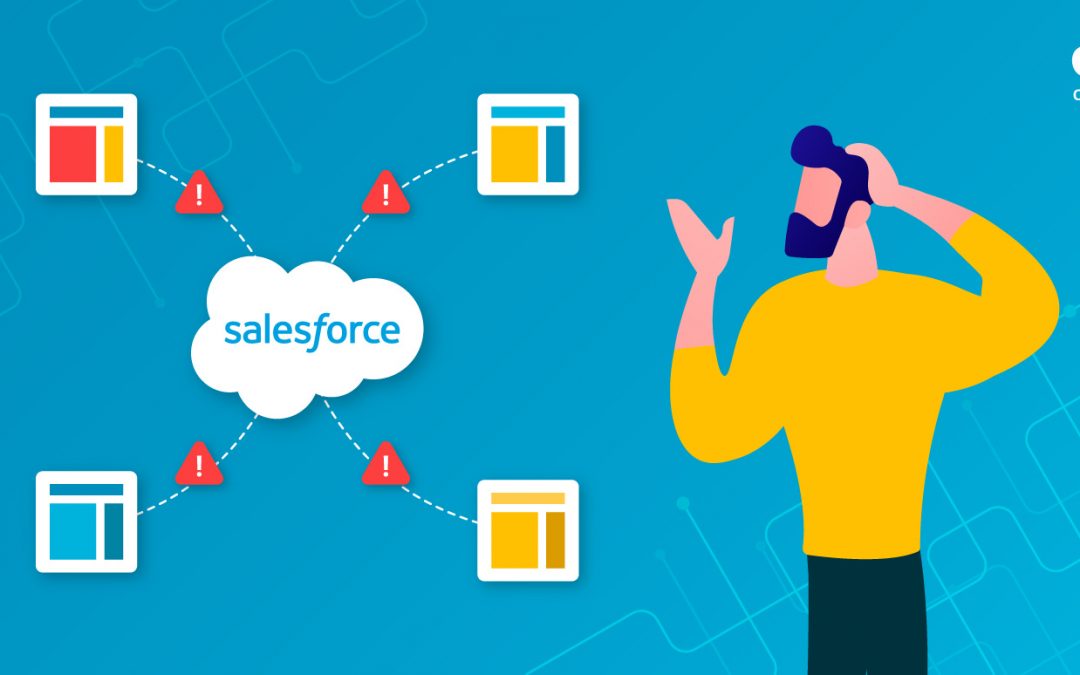Salesforce as an independent SaaS CRM tool has largely found its uses in the industry. Salesforce is extremely easy to use and can be set up within a matter of days. What’s more? It has its own comprehensive e-learning tool that can be your savior in case of a mishap.
However, companies often need to integrate Salesforce with other applications in order to manage their back-end operations. These integrations, at the first glance, seem like a plug and play process.
In reality, though, it is a tough nut to crack. Salesforce Integrations are considered as projects that hold enormous value. When such projects are carried out with a “let’s drive, we will figure out the way” attitude, it often leads to a wrong turn, a dead-end, or worse, an accident.
To avoid such scenarios, it is best to take note of the following challenges and then pave your way accordingly.
Top 8 Commonly Made Mistakes in Salesforce Integrations and How We Can Help

These are the most common mistakes that companies make while carrying out Salesforce Integrations internally. Read on to find out how outsourcing your integrations can help in such scenarios.
Lack of Clarity in Scope
This is the most common and the most absurd mistake that companies make while carrying out their Salesforce Integration: they don’t have a plan.
One would imagine that once you have stated your requirements, the process should be smooth sail ahead. However, when carrying out the process internally, your end-state objective should be crystal clear, not just to you, but to your team as well. To avoid this, you must establish your business objectives and carefully lay them down to your team with the same clarity.
Or, you can leave the task to Experienced Salesforce Consultants like us. Having worked on several other such projects, we can give you a guided and focused solution to all your business scenarios.
Inefficient Data Management
When a project like a Salesforce Integration is planned, the most common mistakes lie in the planning itself.
When starting the project, most people miss out on having a well thought out strategy in place for handling data management crises.
We, as your Salesforce Consultants, will make sure that we have a strategy in place to address data handling and quality issues. We ensure that data fields are mapped properly and custom fields and records are free of data conflicts.
Unclear Data Validation Rules
At the outset of the project, the system that will hold the master records needs to be identified.
This important step often gets overlooked and in case of a data discrepancy between different applications, the final decision cannot be made.
By outsourcing your Salesforce Integration, you can ensure that your data validation rules are set up right at the beginning of the project so as to avoid such scenarios.
Data Redundancy and Data Insufficiency
Another frequently occurring issue is that of data redundancy and insufficiency between the two systems.
Pushing of old records from legacy systems to Salesforce or from Salesforce to other tools can result in severe data handling issues. These issues will result in low data integrity and can become a party pooper in your project.
It is important that your data be cleaned up thoroughly before it is transferred to any other system. If the project is outsourced, as a thumb rule, this step will be followed by your consultants.
(Un)Real-Time Integration
A common misconception about Salesforce Integrations is that exporting and importing data is the same thing as real-time integration.
When Salesforce is integrated with other systems, the data flow happens in batches. So in a moment of time, only a part of the information will be moving. Thus, no matter how many times the data is transferred between applications, there will be a synchronization issue when it comes to real-time changes.
A developer inexperienced at Salesforce Integrations, may not be aware of this complication and might misinterpret “real-time integration”. Hence, it is important to have experienced Salesforce Consultants around, who can guide you through this situation.
Referential Identity Crisis
External IDs can easily be called the trouble-makers in a Salesforce Integration project. The relationship between records within a tool can get severely affected in the case of improperly matched external IDs.
There is a high chance that your team may not foresee this as a road-block and carry on the integration.
A team of experienced Salesforce consultants will take the time to understand how external and unique IDs work and will then carefully and properly match them to their objects in Salesforce.
Unexpected Data Rate Limits
A common problem that internal teams face is the unawareness of data rate limits imposed by Salesforce APIs. This results in frequent run-time errors during the process of integration, which in turn affects the whole project.
There is a governor limit imposed by salesforce APIs on how much data is transmitted at a time, and even during a day.
An experienced Salesforce developer would know this fact. As a result, we know what the data limits are and we design them into the integration accordingly to avoid any runtime errors.
Quality Checks and User Acceptance Tests

It cannot be harped enough on how important it is to test tools and projects for Quality Assurance and User Acceptance. And yet, integrators often make the mistake of not paying much attention to these concerns. As a result, the integration project fails.
As Salesforce consultants, we understand that it is imperative to test the integration for Quality Assurance to ensure the smooth handling of errors. We also ensure User Acceptance testing for it is crucial to the business users to verify proper data handling and the ease of user experience.
In general, most companies face these common Salesforce Integration problems when internalizing the project.
However, with the assistance of a Salesforce consultant like Cloudiate, you can effectively strategize your Salesforce Integration project. As a result, these mistakes can be easily avoided.
If you want to avoid these mistakes and make your Salesforce Integration project a success, get in touch with our team. Contact us at info@cloudiate.com for more information.

